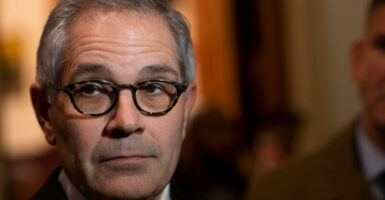This commentary is part of a series on the rogue prosecutors around the country who have been backed by liberal billionaires such as George Soros and Cari Tuna, and the threat those prosecutors pose to victims and others alike.
“F— the FOP [the Fraternal Order of Police]” and “No good cops in a racist system!”
Those are the sayings that supporters of Philadelphia District Attorney Larry Krasner chanted at his election-night victory party two years ago. Did he tell them to stop? No. Instead, he smiled approvingly.
Krasner, a career criminal defense and civil rights attorney, who had sued the Philadelphia Police Department dozens of times over the decades, ran to be Philadelphia’s district attorney and received almost $1.45 million in campaign spending from George Soros in the process.
Unfortunately, Krasner is one of many elected rogue prosecutors around the country who have usurped the legislative power by refusing to prosecute large categories of crimes. By refusing to hold criminals to account, Krasner and his ilk abuse the power of their offices and harm victims and their communities as a result.
A straight line can often be drawn from their anti-cop attitudes and their radically dangerous policies to increases in violent crime. And in Krasner’s case, even to the death of a Philadelphia police officer.
Let’s put it bluntly: Philadelphia Police Cpl. James O’Connor, a 23-year veteran of the Department, would likely be alive today if Krasner had done his job. Instead, Hassan Elliott, a career felon, parole violator, and wanted murderer, gunned down and killed O’Connor on March 13.
The United States attorney in Philadelphia, William McSwain, laid it all out this past March in a press statement, saying, “The murder was the direct result of Philadelphia District Attorney Larry Krasner’s pro-violent defendant policies.”
Sadly, O’Connor is but one of hundreds of victims at the hands of Krasner’s reckless rogue policies.
Favors Career Criminals
The press release outlines how Krasner’s office, following Krasner’s policy guidance, allowed Elliott to roam the streets and kill O’Connor, and includes disturbing facts such as:
- Krasner’s office gave Elliott a sweetheart deal on a gun charge.
- Elliott violated his parole on the gun charge by being arrested for possession of cocaine.
- Krasner’s office took no action on Elliott’s parole violation.
- Krasner’s office, following Krasner’s lax bail policies, allowed Elliott to be released on his own recognizance despite his 2018 firearms conviction.
- Elliott then murdered Tyree Tyrone after he violated his parole while out on bail.
- Krasner’s office withdrew the cocaine charges against Elliott, after the Tyrone murder, despite the fact that Elliott failed to appear for his court appearance on the cocaine charges.
- Krasner’s office failed to detain Elliott, allowing him to prey on more victims, and ultimately to gun down O’Connor.
As the press release from the federal prosecutor bluntly puts it, Elliott was “a gang banger wanted for murder,” yet Krasner’s office “did nothing.”
And that is just one of thousands of cases per year where Krasner’s office, following Krasner’s orders, does nothing instead of faithfully enforcing the law as written.
Non-Prosecution Policies
Immediately after he was elected and sworn into office, Krasner fired 31 career prosecutors in the office, many of whom were in the homicide division and highly experienced. Krasner didn’t do the firing himself; he had one of his top lieutenants do the dirty work, and that person told the career prosecutors they had hours to clear out their desks.
Since deputy district attorneys in the Philadelphia DA’s office serve at will, and don’t enjoy civil service protection, Krasner’s move was legal, but extraordinary.
Like many newly elected rogue prosecutors, Krasner also issued a non-prosecution policy memo to attorneys in his office soon after he was elected.
The Krasner memo required his assistant district attorneys to radically change the way they approach their job, including the following orders:
- Decline to charge four categories of crimes.
- Charge lower gradations of crimes (to make sure no bail is required).
- Divert more cases, including drug distribution.
- Make plea offers that are at the bottom of the state’s guidelines.
- Inform the judge at sentencing proceedings about the financial cost to the state for each year of incarceration.
- Request shorter probation and parole periods.
- Request no more than six months for a technical parole violation (no matter how much “back up time” the offender has).
- Request no more than two years for a regular parole violation (regardless of back up time available).
- Charge no parole violation for a positive marijuana test or if the parolee is caught with marijuana.
These are exactly the type of radical changes to a prosecutor’s office you would expect if you put a dyed-in-the-wool criminal defense attorney, beholden to Soros and his ilk, in charge of a district attorney’s office.
To highlight the absurdity of Krasner’s view of himself as the city’s “public defender with power,” imagine for a moment if the movement’s goal was the opposite: to place career, dyed-in-the-wool prosecutors into the role of head public defender in large jurisdictions, and have those public defenders instruct their deputy public defenders to encourage all or most of their clients to accept responsibility for their crimes, plead guilty, and not oppose the government’s sentencing recommendation.
Both movements, the rogue prosecutor movement and the hypothetical public defender/prosecutor movement, are radical departures from the adversarial system of justice we have in most places, where prosecutors prosecute and enforce the law, and defense attorneys defend the constitutional rights of those accused of crimes, and both handle their respective duties zealously, ethically, and aggressively.
Krasner no doubt knows that it is difficult to quantify the damage of his non-prosecution policies. He also likely knows that it is not possible to quantify the number of cases in which his assistants implement his soft-on-crime approach across all of their responsibilities.
Krasner’s office is essentially ignoring or refusing to prosecute lower-level offenses, such as possession of illegal drugs, loitering, violations of ordinances prohibiting public encampments, and the like, despite the fact that each is a crime under state law.
Murders Are Up
Two hundred and thirty-five additional murder victims, and counting. That’s how many extra dead people there have been in total in the city of Philadelphia since Krasner took over.
Despite the fact that the number of homicides and violent crime across the country have been going down for decades, the number of homicides and violent crimes in Philadelphia has exploded since Krasner was elected, and the vast majority of the victims are black.
In the three years before Krasner was sworn into office, there were a total of 867 murders in the city of Philadelphia, an average of 289 murders per year.
Krasner was sworn in in January 2018. In 2018, there were 351 murders; 2019 there were 347 murders; and as of Oct. 28, there have been a whopping 404 murders, for a total of 1,102 murders, an average of 367 murders a year and counting.
As a result of Krasner’s hands-off approach, the U.S. attorney for the Eastern District of Pennsylvania (headquartered in Philadelphia) has picked up the slack by prosecuting violent crimes that can be charged in federal court.
McSwain, the U.S. attorney and a former Army Special Forces officer, has repeatedly called out Krasner, saying that his “radical experiment has failed,” that he is “fed up” with Krasner’s “new culture of disrespect for law enforcement,” and that you can “draw a straight line from these policies to the carnage on the streets.”
Automobile Thefts Up
The number of auto thefts across the country have been going down for the last two years. But not in Philadelphia since Krasner was elected.
His non-prosecution policies have negative social consequences, and criminals who aren’t held to account affect the quality of life for all residents of Philadelphia.
In the two years prior to Krasner taking office, there were 11,187 car thefts, on average 5,594 thefts per year.
In 2018, the year Krasner took over, there were 5,997 car thefts, and in 2019, there were 5,862, for a two-year total of 11,859, or an average of 5,930 auto thefts per year.
Not surprisingly, the number of auto thefts in 2020 (as of Oct. 25) is up over 28% from last year, and stands at 7,152 auto thefts.
Commercial Burglaries Up 130% Over Last Year
You don’t have to click on hyperlinks to learn that commercial burglaries are up in Philadelphia. All you have to do is watch the television and see the rioting, destruction of property, and criminal behavior by thugs in downtown Philadelphia.
As of Oct. 25, there have been 2,379 commercial burglaries in the city—a massive 130% increase from 2019, when there were only 1,031 commercial burglaries. Compare that to the year 2017, before Krasner took office, when there were only 1,399 commercial burglaries.
Aggravated Assaults with a Gun Up 42%
In 2019, there were 2,131 assaults with a gun in Philly, and 2,327 in 2018. The year before Krasner was elected, 2017, there were only 2,207 gun assaults, and in 2016 there were 2,254 such assaults.
But in 2020, as of Oct. 25, there have been 3,040 assaults perpetrated with a gun, a stunning 42% increase from 2019.
Rogue Prosecutors’ Achilles Heel
As we wrote in our commentary about Marilyn Mosby, the Baltimore rogue prosecutor, the Achilles heel for the rogue prosecutor movement is the fact that crime rates, especially violent crime, rise in cities where they are in charge.
When you listen to them talk, they use the same pet phrases: mass incarceration, structural racism, prosecutorial discretion, school-to-prison pipeline, restorative justice, reimagining policing or prosecution, over-policing, institutional change, and correctional-free lunch. The latter would require prosecutors to take into consideration the cost of incarcerating people.
But when you look at the actual crime rates in the cities where these prosecutors have been elected, those rates have gone up dramatically, and the rogue prosecutors from those cities don’t like to hear it.
To date, Krasner has refused to explain why crime rates have gone up under his watch, or how his non-prosecution policies have made the City of Brotherly Love safer.
No need to really, though, because we already know the answers.
Check Out the Numbers Yourself
Click on the links, by year, for crime statistics reported to the FBI.
FBI numbers: 2015, 2016, 2017, 2018
For some reason, crime statistics are not available for Philadelphia for year 2019, either because Philadelphia did not provide them to the FBI, the FBI did not trust the numbers, or some other reason. Crime statistics for 2019 and 2020 can be found on the Philadelphia Police Department website, linked here.
























